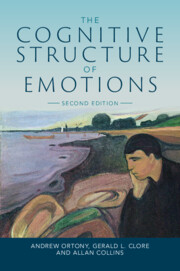Book contents
- The Cognitive Structure of Emotions
- The Cognitive Structure of Emotions
- Copyright page
- Dedication
- Contents
- Figures
- Tables
- Preface to the Second Edition
- Preface to the First Edition
- Chapter 1 Introduction
- Chapter 2 Overview of the Theory
- Chapter 3 Appraisal, the Value System, and Primary Sources of Intensity
- Chapter 4 Factors Affecting the Intensity of Emotions
- Chapter 5 Reactions to Events: I
- Chapter 6 Reactions to Events: II
- Chapter 7 Reactions to the Actions of Agents
- Chapter 8 Reactions to Objects
- Chapter 9 Formalization of the Theory and Additional Issues
- Chapter 10 There and Back Again: OCC and Affective Computing
- Appendix
- References
- Author Index
- Subject Index
Chapter 7 - Reactions to the Actions of Agents
Published online by Cambridge University Press: 04 August 2022
- The Cognitive Structure of Emotions
- The Cognitive Structure of Emotions
- Copyright page
- Dedication
- Contents
- Figures
- Tables
- Preface to the Second Edition
- Preface to the First Edition
- Chapter 1 Introduction
- Chapter 2 Overview of the Theory
- Chapter 3 Appraisal, the Value System, and Primary Sources of Intensity
- Chapter 4 Factors Affecting the Intensity of Emotions
- Chapter 5 Reactions to Events: I
- Chapter 6 Reactions to Events: II
- Chapter 7 Reactions to the Actions of Agents
- Chapter 8 Reactions to Objects
- Chapter 9 Formalization of the Theory and Additional Issues
- Chapter 10 There and Back Again: OCC and Affective Computing
- Appendix
- References
- Author Index
- Subject Index
Summary
Four “Attribution” emotions relating to the attribution of responsibility for actions are presented as the emotion types that emerge from praising or blaming oneself or some other agent for some action. The intensity of these “Pride” and “Self-reproach” emotions, and “Admiration” and “Reproach” emotions is influenced by the perceived praiseworthiness (including its converse, blameworthiness) of the agent’s action and the degree to which it is seen as being incongruous, that is, as deviating from what might be expected of such an agent in such a situation. The notion of a cognitive unit is used to explain such facts as that people can be proud of the actions of other people. Also covered are four Compound emotions that result from focusing on both an agent’s action and its outcome at the same time. These emotion types include what are referred to as “Gratitude,” “Anger,” “Self-satisfaction,” and “Self-anger” emotions, with the first of these, for example, being characterized as a positive feeling about someone else’s praiseworthy action and the associated desirable event.
Keywords
- Type
- Chapter
- Information
- The Cognitive Structure of Emotions , pp. 153 - 176Publisher: Cambridge University PressPrint publication year: 2022

